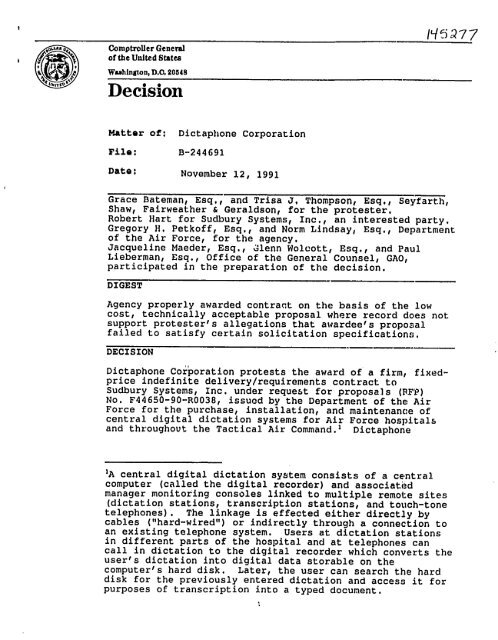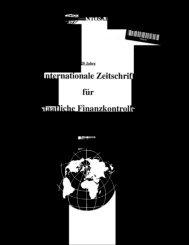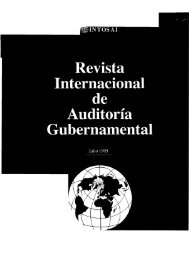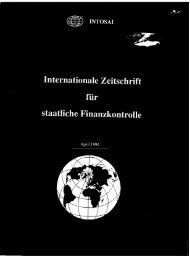B-244691 [Protest of Air Force Contract Award for ... - (GAO) - Archive
B-244691 [Protest of Air Force Contract Award for ... - (GAO) - Archive
B-244691 [Protest of Air Force Contract Award for ... - (GAO) - Archive
Create successful ePaper yourself
Turn your PDF publications into a flip-book with our unique Google optimized e-Paper software.
Comptroller General<br />
<strong>of</strong> the United States<br />
Washington, Dc. 20548<br />
Decision<br />
Matter <strong>of</strong>: Dictaphone Corporation<br />
File: B-<strong>244691</strong><br />
Date: November 12, 1991<br />
1969.as<br />
Grace Bateman, Esq., and Trisa J, Thompson, Esq., Seyfarth,<br />
Shaw, Fairweather & Geraldson, <strong>for</strong> the protester,<br />
Robert Hart <strong>for</strong> Sudbury Systems, Inc., an interested party.<br />
Gregory R. Petk<strong>of</strong>f, Esq., and Norm Lindsay, Esq., Department<br />
<strong>of</strong> the <strong>Air</strong> <strong>Force</strong>, <strong>for</strong> the agency.<br />
Jacqueline Maeder, Esq., Glenn Wolcott, Esq., and Paul<br />
Lieberman, Esq., Office <strong>of</strong> the General Counsel, <strong>GAO</strong>,<br />
participated in the preparation <strong>of</strong> the decision.<br />
DIGEST<br />
Agency properly awarded contract on the basis <strong>of</strong> the low<br />
cost, technically acceptable proposal where record does not<br />
support protester's allegations that awardee's proposal<br />
failed to satisfy certain solicitation specifications.<br />
DECISION<br />
Dictaphone Corporation protests the award <strong>of</strong> a firm, fixedprice<br />
indefinite delivery/requirements contract to<br />
Sudbury Systems, Inc. under request <strong>for</strong> proposals (BFP)<br />
No. F44650-90-R0038, issued by the Department <strong>of</strong> the <strong>Air</strong><br />
<strong>Force</strong> <strong>for</strong> the purchase, installation, and maintenance <strong>of</strong><br />
central digital dictation systems <strong>for</strong> <strong>Air</strong> <strong>Force</strong> hospitals<br />
and throughout the Tactical <strong>Air</strong> Command.' Dictaphone<br />
'A central digital dictation system consists <strong>of</strong> a central<br />
computer (called the digital recorder) and associated<br />
manager monitoring consoles linked to multiple remote sites<br />
(dictation stations, transcription stations, and touchstone<br />
telephones). The linkage is effected either directly by<br />
cables ("hard-wired") or indirectly through a connection to<br />
an existing telephone system. Users at dictation stations<br />
in different parts <strong>of</strong> the hospital and at telephones can<br />
call in dictation to the digital recorder which converts the<br />
user's dictation into digital data storable on the<br />
computer's hard disk. Later, the user can search the hard<br />
disk <strong>for</strong> the previously entered dictation and access it <strong>for</strong><br />
purposes <strong>of</strong> transcription into a typed document.
protests that the system Sudbury proposed, the RTAS 8000,<br />
fails to comply with the minimum, mandatory requirements <strong>of</strong><br />
the solicitation.<br />
We deny the protest.<br />
BACKGROUND<br />
The <strong>Air</strong> <strong>Force</strong> issued the RFP on January 23, 1991, with at<br />
closing date, as extended, <strong>of</strong> March 12. The RFP called <strong>for</strong><br />
award to the low-cost, technically acceptable <strong>of</strong>feror and<br />
included a 14-page statement <strong>of</strong> work (SOW) which gave both a<br />
general overview <strong>of</strong> the requirements and detailed<br />
"functional specifications."<br />
Of the four initial proposals received, Sudbury's and<br />
Dictaphone's were determined to be technically acceptable<br />
and both <strong>of</strong> these <strong>of</strong>ferors were asked to submit best and<br />
final <strong>of</strong>fers (BAFOs). Based on its review <strong>of</strong> the BAFOs, the<br />
<strong>Air</strong> <strong>Force</strong> determined that Sudbury's proposal was the lowestcost,<br />
technically acceptable <strong>of</strong>fer and, on May 20, the <strong>Air</strong><br />
<strong>Force</strong> awarded Sudbury a contract, After learning <strong>of</strong> the<br />
award to Sudbury, Dictaphone first protested to the agency<br />
on June 7. When the agency-level protest was denied,<br />
Dictaphone protested to our Office on July 3.<br />
Dictaphone protests that Sudbury's proposal failed to <strong>of</strong>fer<br />
to comply with all <strong>of</strong> the solicitation requirements and that<br />
Sudbury's systemi is not technically capable <strong>of</strong> meeting all<br />
<strong>of</strong> the solicitation requirements. Specifically, Dictaphone<br />
asserts that Sudbury's system does not allow the user to<br />
alter the speed at which the recorded dictation is played<br />
without changing voice pitch or creating distortion, that<br />
Sudbury's system does not provide the storage redundancy<br />
required by the RFP and that Sudbury will not be able to<br />
meet the maintenance and repair requirements <strong>of</strong> the RFP.<br />
SPEED CONTROL<br />
Dictaphone first protests that Sudbury's RTAS 8000 system<br />
does not provide speed control without changing pitch or<br />
creating distortion as required by paragraph 2c(G)(e) and<br />
(f) <strong>of</strong> the SOW. That section <strong>of</strong> the SOW states:<br />
"(6) Each transcriptionist station will give the<br />
transcriptionist full control over the following<br />
functi-ns:<br />
(e) The ability to increase speed <strong>of</strong><br />
dictation without changing the pitch or<br />
creating distortion.<br />
2 B-<strong>244691</strong>
jf) The ability to decrease speed <strong>of</strong><br />
dictation without changing the pitch or<br />
creating distortion,"<br />
Dictaphone asserts that there is no reasonable basis <strong>for</strong> the<br />
contracting <strong>of</strong>ficer to conclude that Sudbury's system can<br />
meet this specification since Sudbury qualified its response<br />
to this requirement. Dictaphone also says that the RTAS<br />
8000 equipment is technically incapable <strong>of</strong> meeting these<br />
pitch and distortion requirements. Dictaphone bases this<br />
allegation on a prior procurement conducted by the<br />
University <strong>of</strong> Virginia where Sudbury stated that its system<br />
changes a speaker's pitch if the speed is adjusted.<br />
Dictaphone misconstrues Sudbury's proposal. Although<br />
Sudbury responded to section 2c(6) <strong>of</strong> the SOW by stating<br />
that it would "Comply With Qualification," this section <strong>of</strong><br />
the SOW dealt with several requirements in addition to the<br />
pitch and distortion requirement. In our view, a reasonable<br />
understanding <strong>of</strong> Sudbury's proposal is that the<br />
qualification did not pertain to the pitch and distortion<br />
requirement at issue, Sudbury stated in this section <strong>of</strong> its<br />
proposal a qualification that "transcriptionists cannot<br />
currently lengthen or shorten the pause between words."<br />
This particular requirement was deleted in RFP amendment<br />
005, and Sudbury did not take any other explicit exceptions<br />
in the portion <strong>of</strong> its proposal addressing section 2c(6).<br />
Regarding Dictaphone's assertion that Sudbury's RTAS 8000<br />
equipment is technically incapable <strong>of</strong> meeting the RFP's<br />
pitch and distortion requirements, the agency states that it<br />
reviewed Sudbury's proposal, concluded that Sudbury<br />
unambiguously <strong>of</strong>fered to meet those RFP requirements, and<br />
accepted the proposal on that basis. As to Dictaphone's<br />
reference to the prior procurement, the awardee responds<br />
that it has modified its system "to con<strong>for</strong>m with the<br />
solicitation's technical requirements." The agency also<br />
notes that the contracting <strong>of</strong>ficer conducted an in-progress<br />
review <strong>of</strong> Sudbury's equipment at Sudbury's production<br />
facility on July 8 and 9 which confirmed the contracting<br />
<strong>of</strong>ficer's belief that Sudbury's equipment meets the RFP<br />
requirement.<br />
Although agencies frequently provide <strong>for</strong> the testing <strong>of</strong><br />
equipment be<strong>for</strong>e award, this solicitation did not provide<br />
<strong>for</strong> pre-award testing to verify the proposed systems' speed<br />
control capabilities, nor did it specify the extent to which<br />
the speed <strong>of</strong> the recorded dictation must be altered without<br />
3 B-<strong>244691</strong>
affecting the pitch or creating distortion,3 Rather, the<br />
agency only asked <strong>for</strong> equipment compliant with the RFP<br />
specifications. In its proposal, Sudbury expressly <strong>of</strong>fered<br />
to comply with the requirements, Dictaphone's arguments<br />
simply fail to establish the unreasonableness <strong>of</strong> the<br />
agency's determination that Sudbury's equipment satisfied<br />
the RFP speed control requirements.<br />
STORAGE REDUNDANCY<br />
Dictaphone next protests that Sudbury's system fails to meet<br />
the RFP requirement <strong>for</strong> storage redundancy, In this regard,<br />
the RFP provided that the system must provide <strong>for</strong> "duplicate<br />
voice recording to assure continued system operation in the<br />
event <strong>of</strong> a disk failure," and further required:<br />
"(a). . , a dual hard disk drive or hard disk/tape<br />
cartridge configuration <strong>for</strong> this (near real-time)<br />
voice recording, primary/back-up function, Backup<br />
voice capacity must, at a minimum, be<br />
20 percent <strong>of</strong> the primary hard disk voice<br />
capacity . . This back-up process *nust be<br />
transparent to the user, and not degrade normal<br />
operations in any way."<br />
Dictaphone argues that in order to ensure that the back-up<br />
process "(does) not degrade normal operations," the <strong>of</strong>feror<br />
was required to provide "total" redundancy, that is, a<br />
system that provides instantaneous access to 100 percent <strong>of</strong><br />
any type <strong>of</strong> dictation, whether transcribed or untranscribed.<br />
Dictaphone protests that Sudbury's system which <strong>of</strong>fered<br />
back-up storage capacity equal to 20 percent.<strong>of</strong> the primary<br />
hard disk voice capacity failed to comply with the storage<br />
requirement because Sudbury did not propose to provide backup<br />
<strong>for</strong> both transcribed and untranscribed reports and that<br />
this failure would "degrade normal operations."<br />
The <strong>Air</strong> <strong>Force</strong> responds that Dictaphone's argument distorts<br />
the clear requirement <strong>of</strong> the RFP. The <strong>Air</strong> <strong>Force</strong> points out<br />
that, under Dictaphone's interpretation <strong>of</strong> the RFP, an<br />
<strong>of</strong>feror would have to provide an infinite amount <strong>of</strong> voice<br />
storage because the requirement to provide storage <strong>for</strong> both<br />
transcribed and untranscribed dictation would be<br />
never-ending.<br />
2To the extent Dictaphone is now protesting the fact that<br />
the solicitation did not require particular testing or<br />
specify the amount <strong>of</strong> variance in voice speed that was<br />
required, its protest is untimely. See 4 C.F.R,<br />
§ 21.2(a)(1) (1991); Comprehensive Mkt!g. Sys., Inc.,<br />
B-238596, May 29, 1990, 90-1 CPD I 507.<br />
4 B-24469:
In fact, the RFP specifications only require back-up voice<br />
capacity <strong>for</strong> 20 percent primary hard disk capacity, This<br />
requirement was explicitly explained in amendment 003 to the<br />
RFP in which the <strong>Air</strong> <strong>Force</strong> responded to an <strong>of</strong>feror's<br />
question regarding the necessary back-up capacity, The<br />
agency stated that the proposed system must have "40 hours<br />
<strong>of</strong> operational recording time" and "'(rjedundant storage.<br />
in addition to the minimum required storage capacity" and<br />
specifically stated "[(this redundancy is only meant to<br />
recover a short period <strong>of</strong> un-transcribed voice recording in<br />
the event <strong>of</strong> a primary disk failure." Thus, contrary to<br />
Dictaphone's assertion, the REP did not require total system<br />
redundancy. Dictaphone's assertion that Sudbury's system<br />
fails to meet the storage requirements <strong>of</strong> the RFP is without<br />
merit,<br />
MAINTENANCE AND REPAIR<br />
Finally, Dictaphone challenges the acceptability <strong>of</strong><br />
Sudbury's proposal in light <strong>of</strong> the RFP's routine and<br />
priority maintenance and repair requirements. The SOW<br />
provided that "priority designation" must be determined<br />
"solely" by the agency's system manager or designee and<br />
required that <strong>for</strong> priority calls, contractor personnel must<br />
arrive at the troubled site within 10 hours <strong>of</strong> receiving the<br />
call and restore service within 2 hours thereafter.<br />
Dictaphone asserts that Sudbury "cannot possibly meet the<br />
service requirements" since it does not have a nationwide<br />
service <strong>for</strong>ce.3<br />
To the extent Dictaphone asserts that Sudbury cannot per<strong>for</strong>m<br />
the maintenance and repair requirements, Dictaphone is<br />
challenging the <strong>Air</strong> <strong>Force</strong>'s determination that Sudbury is a<br />
responsible contractor. Our Office will not review an<br />
affirmative determination <strong>of</strong> responsibility absent, as<br />
pertains here, evidence <strong>of</strong> possible fraud or bad faith on<br />
3Dictaphone also asserts that Sudbury qualified its proposal<br />
by stating that "priority designation will (be] determined<br />
by our service department and the [agency's] system<br />
manager." In fact, the record shows that, while Sudbury did<br />
qualify its initial proposal in this regard, after the <strong>Air</strong><br />
<strong>Force</strong> pointed out that Sudbury's proposal failed to satisfy<br />
the RFP "priority designation" requirement, Sudbury cured<br />
the deficiency in its BAFO by stating "we will allow the<br />
(agency's] system manager or designee to determine Priority<br />
designation."<br />
5 B-<strong>244691</strong>
the part <strong>of</strong> contracting <strong>of</strong>ficials, 4 C,F.R. § 21.3(n)(5);<br />
All Rite Rubbish Removal, Inc., B-241288, Jan, 31, 1991,<br />
91-1 CPD 99, Here, the record contains no evidence <strong>of</strong><br />
fraud or bad faith on the part <strong>of</strong> the agency contracting<br />
<strong>of</strong>ficials,<br />
The protest is denied,<br />
6<br />
/0 James F. Hinchman<br />
General Counsel<br />
B-<strong>244691</strong>







